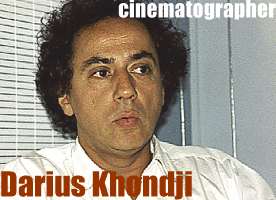 | ||||||||
| text | ||||||||
| Feature Interview - Darius Khondji | ||||||||
 interview and photos by nic wistreich | t t t | dd | ||||||
| Darius Khondji is one of the most celebrated cinematographers of contemporary cinema and when I got the chance to interview him at the Edinburgh festival I was beside myself with a mixture of trepidation and joy. Khondji's list of credits are not as consistently brilliant as some of the world's DP's but when you look at the films again, and not even that closely, you see the work of an incredibly talented man with a true gift of the eye. In Delicatessen (1991) there is clear evidence of the French poetic realist cinema of the 1930's. With Jean-Pierre Jeunet again in City of Lost Children (1995), there is an aesthetic comparison with the grotesque tones in the paintings of German expressionist Otto Dix. He is perhaps best known for his bleak, colour-noir effect in David Fincher's, Se7en (1995), a film with which any film afficionado or regular cinema goer will always remember the cinematography especially. Suspected influences could be drawn from Gordon Willis' lighting of Klute (1971) but Khondji itterates that his one true influence, his 'friend' that never leaves his side is a book by Robert Frank called, The Americans. His comments about the filming and consequent box office reception of Danny Boyle's, The Beach (2000) are particularly interesting and they best reflect his passion for the perfect image. One question I regret not asking him (time restraints!) was what it was like working along side his mentor, the great cinematographer Vittorio Storaro in Bernardo Bertolluci's Stealing Beauty (1996). One might well go on but it would be simpler to simply list the films that he has left his mark upon at the end of the interview. However, I have often wondered how he has not been nominated for more than one Oscar nomination (Alan Parker's Evita, 1997) or, indeed, been awarded an Oscar at all. | ||||||||
| ||||||||